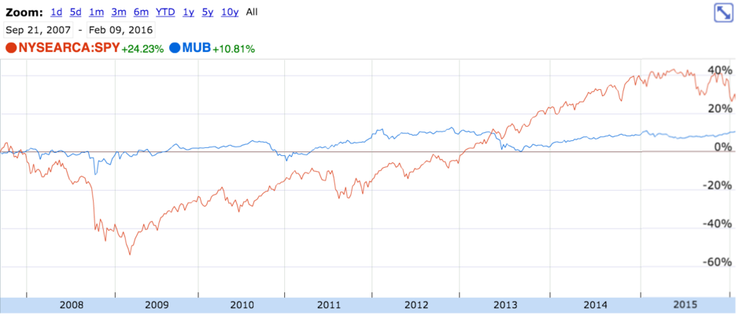
Many investors buy municipal bonds as a safe-haven investment. After all, they are backed by the tax collection abilities of cities and states. They also provide certain tax advantages that boost their tax-equivalent yields over those of Treasuries and corporate bonds. This helps further mitigate factors like interest rate risk that impact other bonds. Combined, these attributes make muni bonds highly attractive – but how do they hold up in real life?
Muni Bonds as an Equity Hedge
The best equity hedges have little or no correlation with equities. Beta coefficients are the most common ways to measure these correlations. A beta coefficient of zero means that the asset has no relationship with the equity market, which is ideal for investors looking to hedge against equity risk. If equities move lower, these assets may move sideways or even higher in price.
The iShares National AMT-Free Muni Bond ETF (MUB) has a beta coefficient of -0.11. The slightly negative correlation means that these bonds tend to move in slightly opposite directions of equities. On the whole, the beta coefficients of muni bond funds ranges between -0.58 and 0.23. These low numbers on both sides of zero indicate that muni bonds are a great hedge against risks in the equity markets.

These tendencies are confirmed by comparing the performance of MUB and the SPDR S&P 500 ETF (SPY) in Figure 1. The muni bond fund remained relatively steady over time and did not react negatively to the recent market turbulence or to prior instances of market turbulence.
Muni Bonds vs. Traditional Bonds
It’s clear that municipal bonds provide a great hedge for equity markets. But how do they compare to traditional bonds?
Aggregate U.S. bond funds have beta coefficients of between -0.4 and 0.67. The sub-1.0 readings suggest that these bonds do diversify against equity risks, but they tend to be a bit more correlated to equities than muni bonds. The top end of overall bond funds has a beta coefficient of 0.67 compared to just 0.23 for muni bond funds. On the other end of the spectrum, some muni bond funds are more negatively correlated than their counterparts.
Muni bonds are also generally regarded as safer than corporate bonds and yield better than Treasuries. In some cases, interest income is free of Federal and/or state taxes. These attributes make them alluring to high-net-worth individuals who can most appreciate the tax breaks. Still, investors should keep a close eye on declining credit quality in places like Chicago and Puerto Rico. If global markets recover, these bonds could also move out of favor.
The Bottom Line
Municipal bonds are widely regarded as a safe-haven investment. Equity investors may want to consider them as a hedge during volatile times. With beta coefficients of between -0.58 and 0.23, muni bonds have a low correlation with equity markets and make for good hedges. These readings are better than most other types of bonds – especially for high-net-worth individuals. As always, investors should be mindful of the risks involved with the muni bond space.






